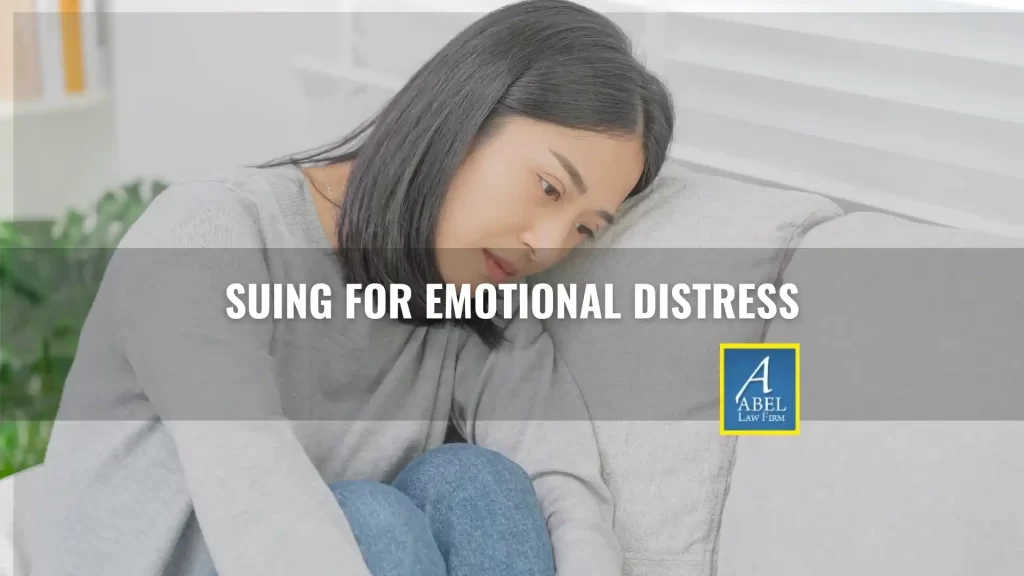Posted on Tuesday, May 16th, 2023 at 7:19 pm

Your feelings are as real as any physical injury, and you have the right to compensation for your emotional distress. The problem with suing for it is that it’s harder to prove than a physical injury or a financial loss.
While suing for emotional distress can be challenging, the Oklahoma personal injury attorneys at Abel Law Firm don’t back down from a fight. This blog covers the basics of suing for emotional distress, and our team has helped many people like you claim compensation for their psychological pain. Keep reading to learn more.
What Is Emotional Distress?
Emotional distress is a term used in personal injury law to describe an accident or injury’s psychological impact on an individual. It’s not always visible, like a broken arm or a bruise, but it’s just as real and can affect your quality of life as deeply. It can include feelings of fear, anxiety, depression, humiliation, or trauma that arise after an accident. It can manifest in symptoms such as insomnia, headaches, or stomach issues.
This emotional turmoil is an entirely normal response to an abnormal situation. After all, nobody expects to be involved in an accident. When it happens, it can disrupt your world, leaving emotional scars that need healing, just like physical injuries. It’s also important to know that Oklahoma law recognizes emotional distress as real and provides the means to recover compensation for your mental pain.
How to Prove Emotional Distress
Unlike physical injuries, emotional distress isn’t something that can be seen on an X-ray or measured with a blood test. It’s a deeply personal experience that varies from person to person. This doesn’t mean it’s impossible to prove — just that it needs careful, strategic presentation. Here are the common methods used to demonstrate emotional distress:
- Documentation: Detailed notes about your emotional well-being can provide strong evidence. Write down your feelings, the severity of your distress, and how it impacts your daily life. For instance, note any activities you’ve stopped enjoying or how your mental state has affected your relationships.
- Medical Records: A diagnosis and treatment records from a mental health professional can significantly strengthen your case. This might include testimony from therapists, psychologists, or psychiatrists who have treated you since the accident. Their professional insights into your mental health can clearly show your suffering.
- Witness Testimony: Statements from family members, friends, or coworkers who can attest to your suffering are often valuable when trying to prove emotional distress. Their testimony can provide firsthand accounts of your behavior and emotional state changes since the accident.
- Intensity and Duration: The severity of your distress and its duration can play a significant role in your claim. High levels of distress or symptoms that have lasted a long time may indicate a more severe case of emotional distress.
How Much Can You Sue for?
For years, Oklahoma law capped compensation for non-economic damages (your losses in an accident that don’t have a defined dollar value) at $350,000 in most cases. However, in 2019 the Oklahoma Supreme Court overturned this law and said it was unconstitutional, even if it’s still on the books. Since the court’s ruling, there is no limit to how much you can recover for emotional distress if you have evidence to support your claim.
Intentional Infliction of Emotional Distress
 While compensation for emotional distress is usually included in a broader personal injury claim, it’s possible under Oklahoma law to sue someone for intentionally causing you emotional distress. (The legal term is “intentional infliction of emotional distress.”) There are two elements you need to prove in these cases. First, you must show that the actions of whoever caused your emotional distress were so extreme and outrageous that a civilized society would consider them atrocious and intolerable. Second, you must show that their actions were intentional or reckless and caused harm beyond the level a reasonable person could be expected to endure. That legal standard is tough to meet, but our firm can help you pursue fair compensation if someone intentionally causes you emotional distress.
While compensation for emotional distress is usually included in a broader personal injury claim, it’s possible under Oklahoma law to sue someone for intentionally causing you emotional distress. (The legal term is “intentional infliction of emotional distress.”) There are two elements you need to prove in these cases. First, you must show that the actions of whoever caused your emotional distress were so extreme and outrageous that a civilized society would consider them atrocious and intolerable. Second, you must show that their actions were intentional or reckless and caused harm beyond the level a reasonable person could be expected to endure. That legal standard is tough to meet, but our firm can help you pursue fair compensation if someone intentionally causes you emotional distress.
How Our Attorneys Can Help You Recover Compensation
Our firm understands how emotional distress can severely dampen your quality of life, and we can help you recover compensation for your pain. We can gather your medical records, talk to mental health experts, take care of filing your initial claim, and negotiate for a fair settlement on your behalf. If the defendant or their insurance company won’t offer a reasonable settlement, we can take your case to court and handle all the trial preparation. We know you’re struggling after an accident, and will make this process as quick and simple as possible.
The team at Abel Law Firm believes anyone who’s suffered emotional distress deserves a chance to recover compensation for their pain. Call (405) 239-7046 today or complete our contact form for a complimentary consultation.


